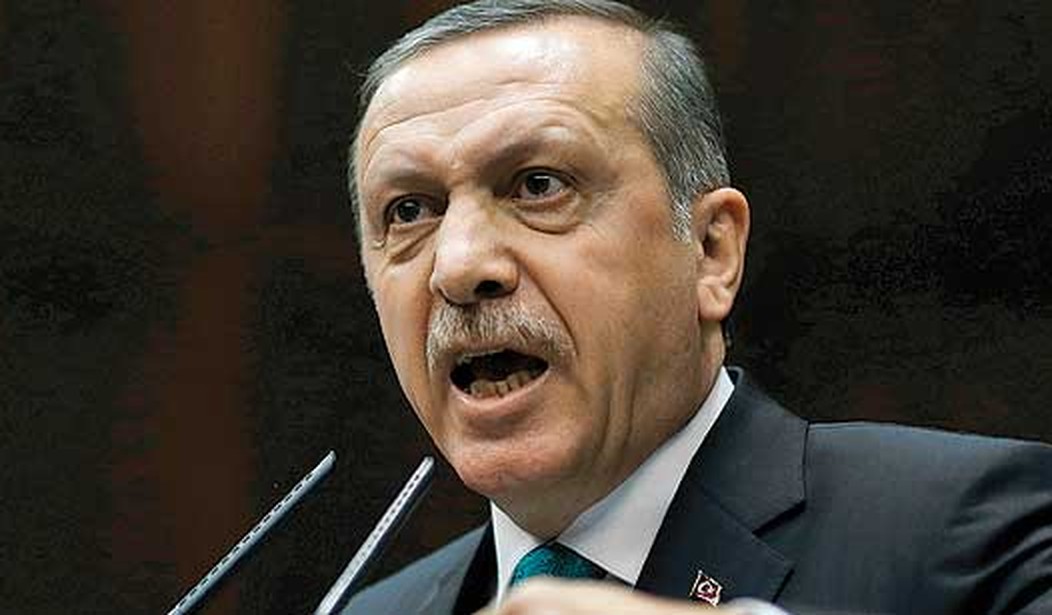Yesterday, Turkish state media outlet Anadolu Agency published details on the location of U.S. special operations forces operating in Syria, complete with maps and troop concentrations, prompting outrage from the Pentagon.
But early today, a newspaper owned by a loyalist of Turkish President Recep Erdogan threatened to reveal more details, provoking an escalating confrontation between the U.S. and our NATO ally.
The threats were published in today’s edition of Takvim, owned by businessman Ahmet Calik (a close friend of Erdogan). The CEO of the company that owns the paper is none other than Erdogan’s son-in-law.
#Erdogan family owned media vows to expose more US troops positions in #Syria even if the US goes nuts about it. Called them as terror hubs. pic.twitter.com/pYdeXKhDSM
— Abdullah Bozkurt (@abdbozkurt) July 20, 2017
The controversy erupted yesterday when Anadolu Agency published a map of U.S. bases in Syria:
[Infographic] US increases military posts supporting PKK/PYD in Syria https://t.co/KebziYDeGr pic.twitter.com/8N7BbWvLir
— ANADOLU AGENCY (ENG) (@anadoluagency) July 19, 2017
#AA'nın 'PKK/PYD'ye ABD desteği' haberi uluslararası basında yankı uyandırdı https://t.co/8IJbm9w16D pic.twitter.com/svt4u9v5CD
— ANADOLU AJANSI (@anadoluajansi) July 19, 2017
Bloomberg Politics reported:
Turkey’s state-run news agency published U.S. base locations in northern Syria, a move that threatens to deepen distrust between the two allies by exposing American soldiers on the front lines of the fight against Islamic State.
In reports published in both Turkish and English on Tuesday, Turkey’s state-run Anadolu Agency provided detailed information about 10 U.S. bases in northern Syria, including troop counts and a map of the U.S. force presence in the Turkish version. The reports said that the military outposts are “usually hidden for security reasons, making it hard to be detected.” It said they were located “in the terrorist PKK/PYD-held Syrian territories,” a reference to Kurdish groups that Turkey’s government considers terrorist organizations.
Despite a tight military alliance dating back to the Cold War, Turkey and the U.S. have been at odds for years now over the U.S. backing of Kurdish fighters in Syria who are affiliated with separatist movements inside Turkey. The Turkish government probably leaked U.S. troop locations to Anadolu as retaliation, according to Aaron Stein, a fellow at the Atlantic Council in Washington.
“The U.S. takes force protection seriously, obviously,” Stein said by email on Wednesday. “The Turkish government knows this, and still decided to leak the locations of U.S. bases in Syria. Hard not to see this as a F-you.”
The Pentagon responded by saying that the move put U.S. troops in danger and jeopardized the coalition mission against ISIS:
The publication by Turkey’s state-run news agency of the locations of what appeared to be U.S. military posts in Syria puts American forces in danger, and the United States has complained to Turkey, a NATO ally, the Pentagon said on Wednesday.
Anadolu news agency published a report on Tuesday naming the location of 10 U.S. military posts in northern Syria, in some cases detailing the number of U.S and French troops present.
“The release of sensitive military information exposes Coalition forces to unnecessary risk and has the potential to disrupt ongoing operations to defeat ISIS,” said Pentagon spokesman Eric Pahon, using an acronym for Islamic State.
“While we cannot independently verify the sources that contributed to this story, we would be very concerned if officials from a NATO ally would purposefully endanger our forces by releasing sensitive information,” Pahon said.
Anadolu Agency appeared to mock the Pentagon’s response late last night:
Pentagon complains about report on US presence in Syria https://t.co/Obg9G2UTG5 pic.twitter.com/nuUAvaB3jp
— ANADOLU AGENCY (ENG) (@anadoluagency) July 19, 2017
The information about the U.S. bases was pushed across pro-Erdogan media in Turkish, English, and Arabic:
10 terör üssü deşifre oldu ABD panikledihttps://t.co/PfJhFhMv3C pic.twitter.com/zUWyYYCr00
— Takvim 🇹🇷 #EvdeKal (@takvim) July 19, 2017
Anadolu Agency reveals increasing number of secret US bases in areas controlled by YPG/PYD terrorists in Syriahttps://t.co/HzBasFzQrI pic.twitter.com/UxGAEtKNee
— DAILY SABAH (@DailySabah) July 19, 2017
Üsleri ifşa olan ABD iyice çıldırdı https://t.co/7Esz2xgjP4 pic.twitter.com/ysTLugjkU2
— Sabah Gazetesi (@Sabah) July 19, 2017
Erdogan and other top Turkish authorities have become vocally belligerent towards their fellow NATO allies in recent months, even threatening “holy wars” in Europe:
Ominous message from #Turkish minister who claims 'holy wars will soon begin in Europe' https://t.co/MGpJTl9ENe #Turkey #Netherlands
— Rita Cosby (@RitaCosby) March 16, 2017
Erdogan urges Turks in Europe: "Make not three, but five children," as revenge on the West. https://t.co/PIkbiZwnkB pic.twitter.com/vf0ju4icAp
— New York Times World (@nytimesworld) March 17, 2017
WHOA! #Erdogan threatened West today by saying their citizens won't be able to walk in streets in safe & secure in any part of the world pic.twitter.com/GmLMWrpjMj
— Abdullah Bozkurt (@abdbozkurt) March 22, 2017
Remarkably, Secretary of State Rex Tillerson was in Turkey just last week:
Cozy Tillerson-Erdogan meeting in Turkey raises hope for warming ties – @amberinzaman https://t.co/qZhv15LnX3
— Al-Monitor (@AlMonitor) July 11, 2017
Several possible factors may be contributing to this escalation by Turkey.
First, they may be trying to dislodge U.S. support for Kurdish forces, which Turkey brands as terrorists:
Trump ends supporting Syrian opposition as US ramps up cooperation with YPG/PYD terrorists https://t.co/fCiFxo1lQF
— DAILY SABAH (@DailySabah) July 19, 2017
Secondly, Turkey was most likely aware that the U.S. was going to stop CIA support for Turkish-backed Syrian rebel groups (announced yesterday).
Thirdly, Erdogan would like the U.S. to extradite his perceived rival, Turkish cleric Fethullah Gulen, who lives in a compound in Pennsylvania and whom Erdogan blames for launching an aborted coup last year.
Since the coup, Erdogan has purged his opponents from the Turkish government and imprisoned more journalist than any other country in the world.
https://twitter.com/Bridget_PJM/status/886004253076148225
Turkey: 'Worst country' for media freedom in 2016 https://t.co/wBJN5KTNgv #MediaFreedom pic.twitter.com/pzvUP8P2VL
— DW News (@dwnews) December 27, 2016
And as I reported here at PJ Media last September, there have been confrontations between U.S. forces in Syria and Turkish troops.
SHOCK VIDEO: U.S.-Backed, 'Moderate' Free Syrian Army Threatens To Kill U.S. Special Forces https://t.co/p1ZYgNDcCo #homelandsecurity
— PJ Media (@PJMedia_com) September 16, 2016
"FSA fighters threatened to 'slaughter' US special forces after they moved into al-Rai with Turkish troops." https://t.co/s9ujtjipy1
— Waqas Mirza (@waqasahmi) September 17, 2016
US Spec Ops were indeed attacked by #NATO "ally" #Turkey in #TalAbyad. Not just jihadists in al-Rai attacked them…https://t.co/5RKBAkIAeA
— Konstantin Krammer (@KonstantinKlug) September 16, 2016
A NATO ally going rogue against the U.S. and European allies in one of the most volatile regions in the world is a grim prospect, especially with hundreds of U.S. troops on the ground and one of our most important air bases in the region potentially at risk (reportedly 60-80 nuclear weapons are housed at Incirlik).
It’s hard to believe that just a few years ago the U.S. media cartel was promoting Turkey and Erdogan as a model of democracy for the rest of the Middle East.
Recall when @nytimes hailed the 'Turkey model' that "effectively integrates Islam, democracy and vibrant economics"? https://t.co/rKhTCli49f
— Patrick Poole (@pspoole) January 6, 2017
The open hostility of our NATO ally proves our Turkish partners are growing more unstable and unreliable. The moves in recent days are intentionally provocative and potentially dangerous to our troops operating against ISIS in Syria. It remains to be seen if this situation will escalate further.









Join the conversation as a VIP Member